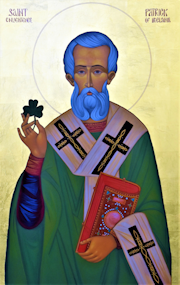Welcome / Fáilte Romhat!
Welcome to the website of the Franciscan Friary in Multyfarnham, Co Westmeath, in the midlands of Ireland.
The Franciscan Abbey here in Multyfarnham was founded in 1269 and continues to be an active centre of Franciscan mission in Ireland. The only Franciscan Abbey in Ireland still andings on the footprint of its original foundation, the Franciscan fraternity here continues its commitment of service from this special place.
St Patrick’s Day
Please note that our Mass on St Patrick’s Day will be celebrated at 10:30am in the Main Church.
There will be no 9:00am Mass today.
We look forward to as many as possible of you being able to join us for this celebration of our national Patron.

50th Anniversary of the permission to restore the Blessed Sacrament Chapel
The Story of the Restoration
February 24 2025 marks the 50th anniversary of the permission given by the Franciscans to restore the Blessed Sacrament Chapel at Multyfarnham. Here, John Kealy OFM, tells the story of the restoration, those centrally involved, John himself, Pat Giblin OFM, Francis Hessian OFM, Hugh Gallagher OFM, the Kirby brothers, Mick and Noel, and how they came together to restore and rebuild a place that is so much loved today.
John tells of scouring the country for stone, slates, and mullions, and how time and again, when these materials were located and their owners heard how they were to be used, the owners had no hesitation in donating them.
Upcoming Events

Perpetual Novena to St Anthony
Our perpetual Novena to St Anthony of Padua continues every Tuesday evening at 8:00pm
We have Mass, including the Novena Prayers, and we conclude by blessing with a relic of St Anthony.
All are welcome and we look forward to seeing you here!
Latest Posts
The Sound of Silence
Paul Simon wrote a song in 1964, “The Sound of Silence” that was released on the album, “Wednesday Morning 3 A.M.” There are very few of us (of those above a certain age!) who do not know it. It is a fascinating song, referring to ‘touching,’ ‘disturbing,’ and ‘whispering’ in describing “The Sound of Silence.” With a title for his reflection of, “The Sound of Silence” it might be thought that Fr Kieran has decided to join the ranks of music reviewers! Not so! Instead, and taking the Gospel about the Transfiguration from the second Sunday of Lent as his subject and the silence of Jesus throughout, Kieran gives us much to think about when considering silence.
Pointing out that the phrase “The Sound of Silence” may seem contradictory, he points to its profound spiritual significance. He observes that silence is not just the absence of noise; it holds multiple meanings shaped by emotions and circumstances. Negative silences, such as those of grief, anger, or guilt, can be painful and unsettling, as seen in the disciples’ fear and shame after Jesus’ crucifixion.
However, Kieran also reflects on the value of a silence that can also be sacred and transformative. Companionable silence fosters deep relationships, while mystical silence allows for spiritual communion with God. Jesus exemplifies the power of silence, particularly in the Transfiguration, where his quiet presence invites deep listening. His retreat into silent prayer before ministry underscores its role in discernment and transformation.
Fr Kieran concludes by inviting us to see Lent as a call to us to embrace meaningful silence, preparing for the joy of Easter when Christ breaks the silence of grief with words of peace. True silence is not emptiness but a space for wonder, prayer, and divine revelation.
The Promise of Hope and the Hope of Promise
Kieran’s reflection this month is on the subject of hope, made especially relevant as this is the Jubilee Year of hope.
In this Jubilee year, whose theme is inspired by St. Paul’s Letter to the Romans (5:5), we reflect on hope’s role in both human and Christian life. Hope, often linked to optimism, helps us move forward despite failure and tragedy. Kieran points to the warning of Pope Francis against a naïve optimism, which overlooks life’s inevitable hardships. A deeper, personal hope emerges through relationships and commitments, particularly in marriage, where vows create a foundation of trust. This hope mirrors God’s covenant with His people and Christ’s faithfulness to the Church. Implicit promises shape moral life and society, forming a “social contract” that fosters security and love.
Christian hope, as a theological virtue, is rooted in God’s promises, while God also places hope in humanity’s potential. Just as parents nurture their children’s promise, we are called to fulfill God’s hope in us. As St. Paul reminds us, faith, hope, and love endure, with love as the greatest.
Multyfarnham and 1798
In this segment, Paschal Sweeney tells us more of the history of the Friary at Multyfarnham, looking particularly at the time of the Rebellion of 1798.
In 1798, political unrest in Ireland reached Multyfarnham, Co. Westmeath. United Irishmen, seeking to support General Humbert, attacked Wilson’s Hospital for weapons. The Warden, initially hostile, was taken prisoner but spared after Fr. Moran intervened.
By 1799, relations between the Church and government improved. The Franciscan friars of Multyfarnham faced declining numbers, with only three in 1800. Despite this, they maintained their traditions.
In 1813, traveler Atkinson described the friary’s humble, simple life, reflecting the enduring faith and poverty of the friars, which survived despite the challenges of the era.
Sealed Orders
As we enter the new year, it’s important to ensure our resolutions align with God’s will, specifically our unique calling as disciples of Jesus. For his reflection, Fr Kieran is inspired by Agnes Sanford’s idea of “sealed orders” in her autobiography of the same name.
Kieran explores how prayer, sacraments, and loved ones help us uncover our divine mission. Just as Hannah, Samuel, and Jesus were guided, we too must remain open to God’s direction, which may evolve throughout our lives.
The example of Simeon, Anna, and other figures shows that God continually reveals new purposes, urging us to fulfil His plan through prayer, devotion, and the support of those around us.
